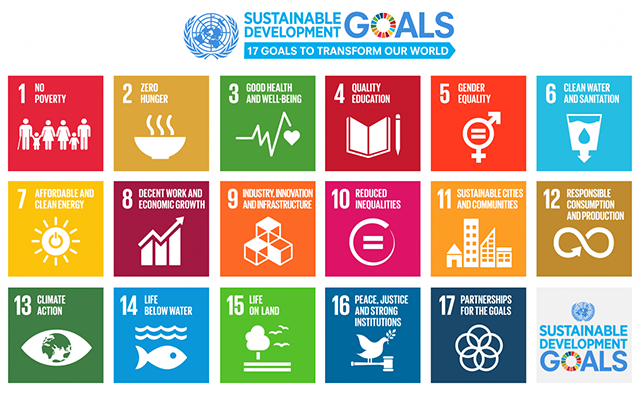The Sustainable Development Goals (SDGs), otherwise known as the Global Goals, are a universal call to action to end poverty, protect the planet and ensure that all people enjoy peace and prosperity.
These 17 Goals build on the successes of the Millennium Development Goals, while including new areas such as climate change, economic inequality, innovation, sustainable consumption, peace and justice, among other priorities. The goals are interconnected – often the key to success on one will involve tackling issues more commonly associated with another.
The SDGs work in the spirit of partnership and pragmatism to make the right choices now to improve life, in a sustainable way, for future generations. They provide clear guidelines and targets for all countries to adopt in accordance with their own priorities and the environmental challenges of the world at large. The SDGs are an inclusive agenda. They tackle the root causes of poverty and unite us together to make a positive change for both people and planet. “Poverty eradication is at the heart of the 2030 Agenda, and so is the commitment to leave no-one behind,” UNDP Administrator Achim Steiner said. “The Agenda offers a unique opportunity to put the whole world on a more prosperous and sustainable development path. In many ways, it reflects what UNDP was created for.”
-

Effects of Agriculture
Riley Brutto '20 and Maddy Chow '20
Due to a lack of education among their population, many Brazilians turn to agriculture as a way to provide for themselves and their families. Additionally, low labor costs draw in large commercial companies that establish business in these developing worlds. However, to obtain farmland in ... Read More
-

Coastal Waters
Alison Deng '20 and Winny Liu '20
Coastal water, specifically coastal erosion, has been a growing problem due to human impact.
-

Global Climate Change: Changing Weather Patterns
Janna Jann '20 and Sabrina Meng '20
You can take action to combat global climate change! Here are some starting points:
- Use heating only when necessary
- Reduce energy consumption
- Reduce, Reuse, Recycle!
- Use resources wisely!
-

Urbanization in India: An Obituary
Meghana Karan '20 and Shruti Shakthivel '20
India is urbanizing very rapidly due to the movement of people from rural areas to urban cities for better opportunities. India does not have the resources or money to back this rapid urbanization of the population in general. This urbanization has created many environmental problems with air and water pollution.
-

Threats to Ocean Biodiversity
Allia Lin '20 and Grace Wulffraat '20
Overfishing
Taking fish out of the ocean faster than their populations can be naturally replenished
-

Agricultural Practices Destroying the Environment
Ayan Mallik '20 and Ethan Talreja '20
- 50% of the world's habitable land has been converted for farming (Farming: Habitat Conversion, 2017)
- Indonesia rain forests have been cleared for the construction of palm oil plantations
- This threatens the habitats of endangered species such as the Asian elephant
-

Waste Management
Rachel Moreno '20 and Alana Depaz '20
"Human society sustains itself by transforming nature into garbage."
~Mason Cooley
-

Industrial Impact
Sravani Ponnaluri '20 and Emily Gonda '20
Industries burn fossil fuels to create goods which releases carbon dioxide into the atmosphere. CO2 contributes to 20% of the world's greenhouse effect, and the level of it in the atmosphere has increased to over 400 ppm when before the French Revolution it fluctuated between ... Read More
-

The Groundwater Crisis
Austin Shwatal '20 and Ethan Tse '20
What is Groundwater? Groundwater is simply any water that is found in underground permeable rock layers known as aquifers
-

Coastal Erosion and Flooding
Arohi Singh '20 and Neha Maddali '20
The effects of human activities on our coasts.
-

Solution & Effects of Agricultural Practices
Ryan Talusan '20 and Caitlyn Castillo '20
A potential solution of vertical farming
- PROFITABLE
- SCALABLE
- YEAR-ROUND


